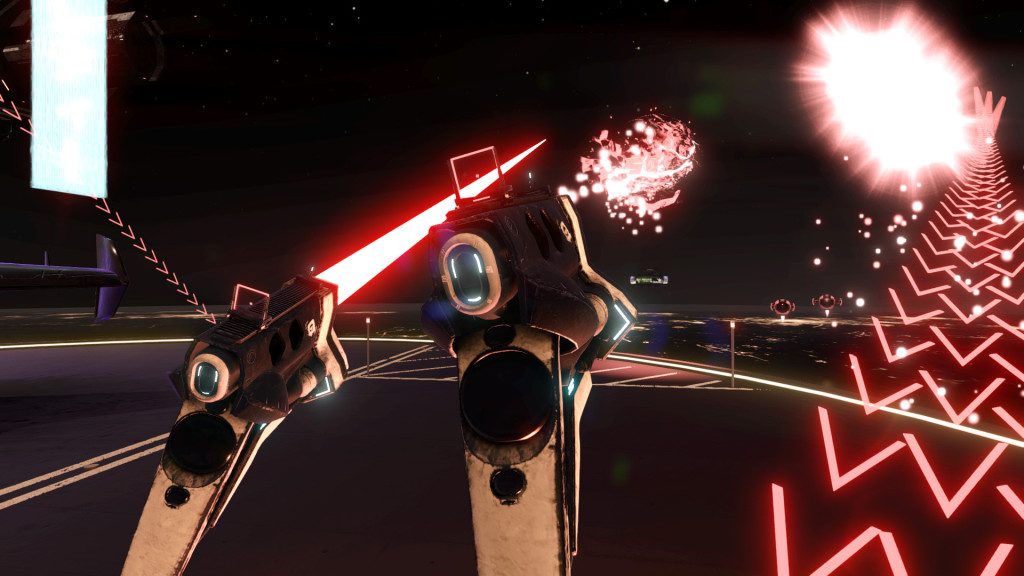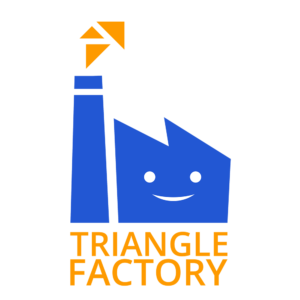FLEGA: Despite the young age of the VR medium, there are already a lot of platforms out there. Why did you choose the HTC Vive? Did you consider any of the others?
DvW: I was one of the early backers of the Oculus on Kickstarter, so I was exited about the return of VR from the very beginning. When I tried to play Half-Life on it, however, I experienced severe motion sickness. I had to spend the rest of the day in bed. For a while I thought VR would not be for me. This changed when I received a free prototype of the Vive from Valve after I had sent them an email (I still had some contacts there from the release of my previous game Element4l). I started playing around with the device and noticed that the motion sickness was almost non-existent. As for the other platforms: I’m looking into the Oculus Rift and PlayStation VR. The most important things for Space Pirate Trainer are a smooth framerate and accurate tracking of the player’s hands. Both devices have good solutions for that.
Did you change Space Pirate Trainer a lot, based on user feedback?
The game was released on Steam Early Access on April 5. I did receive a lot of feedback from gamers, but also from a lot of other developers that are working on VR. Some of them are really well know, like the people behind Guitar Hero and Project Cars. The strangest feedback was probably when I started getting questions about the accuracy and realism of the aiming. Space Pirate Trainer was always meant to be an arcade game, not a simulator, but we have allowed players to adjust the aiming to their liking. Currently we have 6 people working on the project. We want to have a beta by the end of summer and the final game should be ready by the end of the year. We are still adding loads of features and refinements. We have a long list of things we want to integrate.
Do you do a lot of user testing?
Not really, loads of people are already playing the game and giving ample feedback. Fun fact: Justin Roiland, one of the creators behind the incredibly popular Adult Swim cartoon Rick and Morty (of which I am a big fan), has been playing a lot of Space Pirate Trainer. He even held one of the hi-scores in the alpha. How cool is that!?
How did the game become one of the official launch titles for the Vive?
Actually, that all happened by accident. I never thought the game would take off like it did. In the beginning I just wanted to play around with the hardware, see what I would be able to create. I noticed that there weren’t any shooters yet and that sparked the idea for Space Pirate Trainer. It’s a very simple concept: it’s like Galaga for a new generation. One day I got an email from Valve. They asked me if I would be interested in demoing my game at a big media event that they would be holding in Seattle. I worked day and night for four/five days in a row to get the game ready and jumped on a plane to Seattle. The rest is, as they say, history. The biggest game media in the world got to play my game and it was greeted with positive responses. It even got featured on the homepage of Polygon, which to me was a dream come true.
One of the biggest benefits about being one of the launch titles is that I don’t have to worry about marketing. HTC & Valve are showcasing the game all around the world and it doesn’t cost me a dime. This doesn’t mean that we aren’t taking any risks though. Space Pirate Trainer is mainly financed from the earnings of Element4l and we also have some revenue from the sales of Space Pirate Trainer on Steam Early Access. The cool thing about VR is that the market is still very nascent. When you release a game for other platforms, you have big sales around launch and then it usually implodes (unless you have a sale or something). VR is totally different. Our sales have actually been growing steadily because more and more people are getting hold of the VR device that they pre-ordered.
Justin Roiland, one of the creators behind the incredibly popular Adult Swim cartoon Rick and Morty, has been playing a lot of Space Pirate Trainer. He even held one of the hi-scores in the alpha.
What advice would you give to other developers concerning PR? They won’t all have the full support of HTC/Valve like you have …
One of the most important things I learned from Element4l is that you have to invest a lot of time in building up a community around your game. You have to create a personal bond with them. It’s also important to get to know journalists and influencers. If you showcase your game at conventions and your game is any good, then you will attract these people automatically. They are all passionate about games in general and if you can make them enthusiastic about your game, then they will probably give you the free coverage you are hoping for. It’s all about getting to know people personally.
Does Space Pirate Trainer take up all of your time now? What does an average day look like for you?
When we get up in the morning we immediately start monitoring Steam, Twitter, Reddit, YouTube, Twitch … I look for things that are being written or said about our game. I don’t usually intervene, unless people are providing wrong information. The rest of my time is usually taken up by implementing new features. We have a long list of possible features on Basecamp and work in sprints. Like a lot of developers we do agile development. Because a lot of people are experimenting with VR, we are also continuously learning new things and adjusting our game. We want to be as unique as we can, so if we notice that another developer is doing something similar to what we are doing, we rework our ideas. Unique IP is very important to us.
What is the most important lesson you’ve learned so far? Are there any pitfalls to avoid or insights that you can give us?
Everything in VR must have a response. Because people feel so present in VR games, they experiment with the environment even more than in other games. One of the things that we’ve added in our game is that you can actually shoot yourself. Scale is also very important. Everything has to be just right. It’s a lot harder to get away with things. Performance is also crucial. The frame rate can’t go below 90fps.
What do you hope to get out of Space Pirate Trainer? Are you aiming for break-even or do you think you can even make a profit from the game, despite the low installed base of VR?
We really love what we do and I think the most important thing for us is that we make a great game. It would be awesome if, in a few years time, people would look back on Space Pirate Trainer as one of the first great VR games. It might even turn out to be a cult classic. That would be very cool. Those are our dreams, but I am happy to say that the game is already performing well. Half (!) of the people that currently own a Vive have bought our game, so we have great market penetration.
Half (!) of the people that currently own a Vive have bought our game, so we have great market penetration.
How do you personally see the future of VR? What do you say to the critics that compare VR to 3DTV?
Of course there is no way to know for sure what the future will bring, but I have given hundreds of demos and everybody that gets the chance to try the technology is absolutely blown-away. Even people that previously weren’t interested in games, walk away impressed. The most important thing is that people get to try the hardware (in the US, people can play the Vive in GameStop, a huge game retailer chain).
My only fear is that the installed base won’t be that big in the beginning. A big installed base is really important, because otherwise it won’t be interesting for developers to keep developing games for it. That’s why you did not see a lot of Triple-A releases for VR yet. The risks were just too high, but there is definitely a lot of stuff incoming now. I’m betting on social VR to really stir things up. I think this might just be the key to mainstream success for VR. We might even put some social VR in Space Pirate Trainer. Fighting back-to-back would be particularly awesome.
How can we entice you to do a talk about VR at a FLEGA Café?
(laughs) I’m happy to talk to anyone about this! I think a lot of developers are struggling with the financial side. My best advice is to just try to make something cool. Take risks when it comes to gameplay. VR is so young that Indie devs can still really make a difference for the future of the medium.









